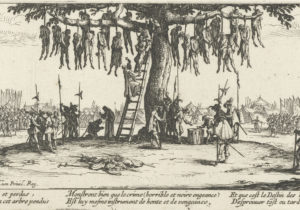Sometimes you don’t know what you got till it’s gone. Not only is that an amazing 1980s rock love ballad by Cinderella (no relation to the cartoon), but it’s also a basic truth about politics. Often we do not realize how good we have it till we have lost something. Freedom is often something that we do not appreciate until it’s gone. We tend to notice it most when we sense its absence. Our current civic rancor and polarization are so shocking because we have enjoyed relative civil peace and respect for so long.
The form of government that has dominated the Western world for roughly 400 years is what is referred to as the nation-state. The world was not always organized into nations with strong centralized governments that exercised sovereignty over a clearly demarcated territory. These nations gave birth to many great and terrible things but, in sum, have been extremely durable and effective ways of organizing our countries, which is why they have been around for so long.
The nation-state was able to harness emerging consciousness that had developed in Europe and were unleashed with the Reformation and the growth of technologies like the printing press. Nations became thinkable as “imagined communities,” in Benedict Anderson’s phrasing. French, English, Spanish, Swiss, Swedes, Danes, and much later Italians and Germans began to think of themselves as not defined merely by local, familial, or regional ties, but as part of a much larger community, a nation, that encompassed many more people and definite boundaries. These communities were often associated with a specific ethnic identification, language, and shared culture, even if there had been no shared culture in the past. Many people who resided within the boundaries of modern-day France did not actually speak French for some time.
The growth of globalism and cosmopolitanism, especially amongst our elite, threatens the nation as a site for devotion and effective control when so much happens outside a country’s borders. Many of the most powerful and wealthy people in our country imagine themselves as “citizens of the world,” rather than as citizens of the United States of America.
With the election of Donald Trump and the resurgence of nationalism, evidenced in the shocking Brexit vote, the anti-European Union government that has taken power in Italy, and the nationalist governments in Hungary and Poland, it would seem that this new wave of reaction against globalism and supra-national institutions was a sign of the vitality of the nation-state.
But the narrative is more complicated than these developments show. The current nationalist fervor could actually be a sign of the weakness of the nation-state, a gasp that belies a real weakness about our confidence in it as a form of government that can adequately represent a people and its aspirations, let alone govern it fairly and effectively.
The new nationalism could, in fact, be the manifestation of deeper disagreement about our government, where one side seeks to defend and reassert the nation as the proper locus for government and decision making while the other desires something new.
On top of all this, there is a rather long list of theologians who view the nation-state and the ideologies it has generated as simply idolatrous and evil. The list is long and familiar and mostly includes liberal Christians or left-wing evangelicals. However, evangelicals and conservative Protestants have been more reticent and ambiguous of late. Though they are not as full-throated in their denunciations of the nation, they are neither rushing to its defense, at least not at The Gospel Coalition, Christianity Today, or the Ethics and Religious Liberty Commission.
Pierre Manent, a prominent French intellectual and philosopher, has made a compelling case that the resources of the nation-state have dried up in France and the West and that its prospects for the future do not look good. The nation-state was a solution to the problems that Europe faced with the breakdown of political Christendom. Cohesive national cultures were developed and supplied a sufficiently tangible new political form that earned people’s loyalties, solved the problem of religious conflict, and provided the order and governance in which Europe would thrive. But the European Union has sidelined the nation in favor of peace, human rights, no borders, and universal humanity.
Coming from a different angle, and with impatience rather than despair, progressive critics believe it is high time we left behind this atavistic form of government and reimagine politics in a world that is increasingly interconnected. Rana Dasgupta crystalizes the progressive sense that what is needed is a new global model of politics rather than the old nation-state model:
If we wish to rediscover a sense of political purpose in our era of global finance, big data, mass migration and ecological upheaval, we have to imagine political forms capable of operating at that same scale. The current political system must be supplemented with global financial regulations, certainly, and probably transnational political mechanisms, too. That is how we will complete this globalization of ours, which today stands dangerously unfinished. Its economic and technological systems are dazzling indeed, but in order for it to serve the human community, it must be subordinated to an equally spectacular political infrastructure, which we have not even begun to conceive.
If you feel like you are seeing a rerun of the old progressive tropes about international government and a common humanity, you would not be wrong. But, to Dasgupta’s point, the old nation-state system did come into existence as a response to needs and realities of the world in which people were living. In our hyper-globalized world, maybe Dasgupta has a point? However, there is a historical precedent, ironically, for what Dasgupta and other progressives want: the Roman Empire. And the Romans were actually quite good at keeping international order.
Are these critics right that the nation-state has become eclipsed? I am skeptical. First of all, what will replace the nation-state as the ultimate bearer of political authority? There seems to be nothing on the horizon. The EU seems increasingly endangered and embattled. The United Nations has only grown more pathetic and feckless as it has aged. If people have a growing sense of disillusionment with their national governments, they have even less confidence and attachment to international institutions.
Furthermore, there is the question of whether international institutions will ever be able to develop the sort of loyalty and effectiveness in governance that can only come about through government that is near to people and adequately represents them.
No doubt we are entering rough waters in the years ahead, both in the US and across the West. Rumors of the demise of the nation-state are a bit premature, but we are facing a set of challenges that will not be easily solved. Christians should not be indifferent about the existence and vitality of our system of government in the Western world. We should commit ourselves to reform and strengthen the nation-state system.
—
Daniel Strand, a Providence contributing editor, is a postdoctoral fellow in the Center for Political Thought and Leadership at Arizona State University. His scholarly interests are in history of political thought, religion and politics, and the thought of St. Augustine of Hippo.
Photo Credit: Pixabay.






